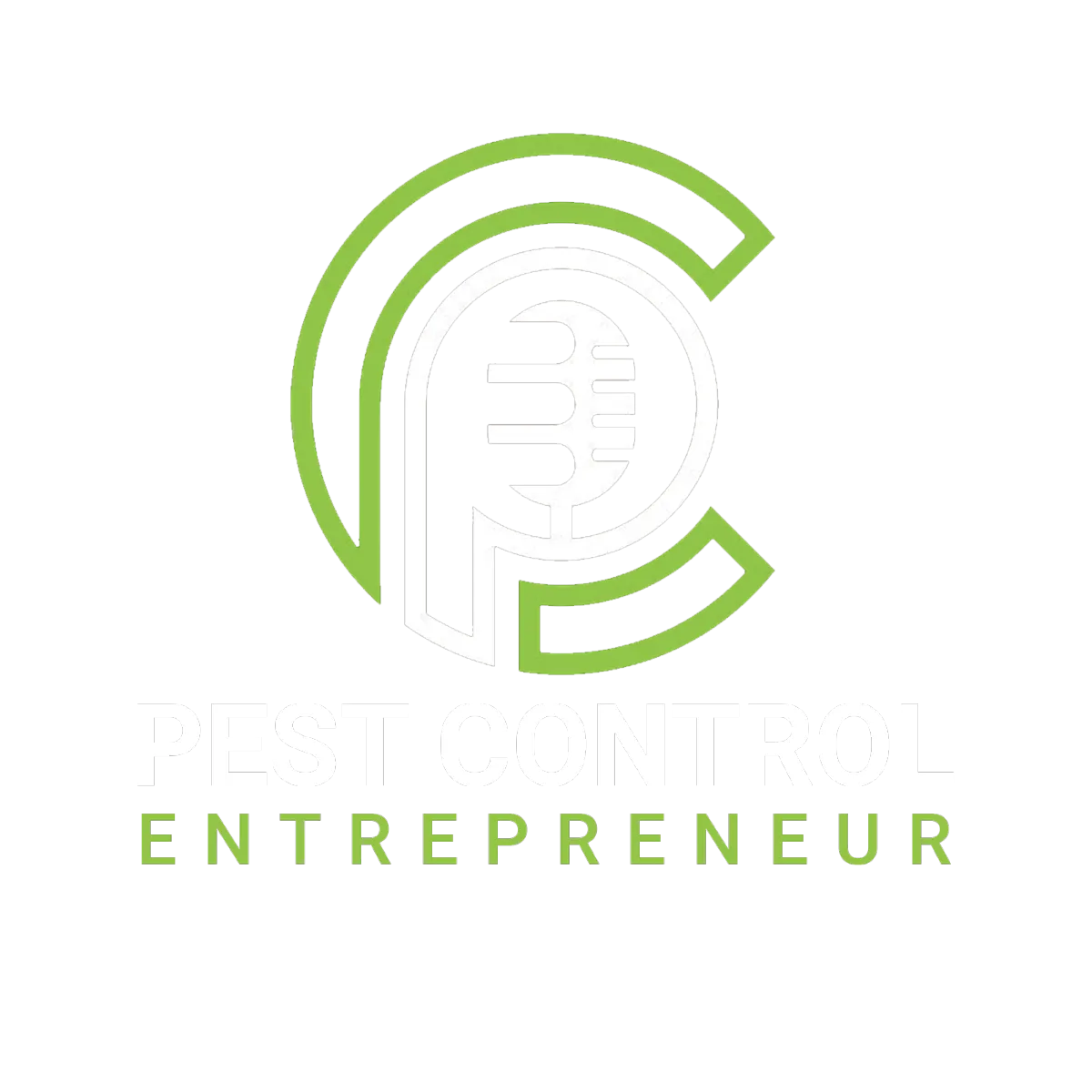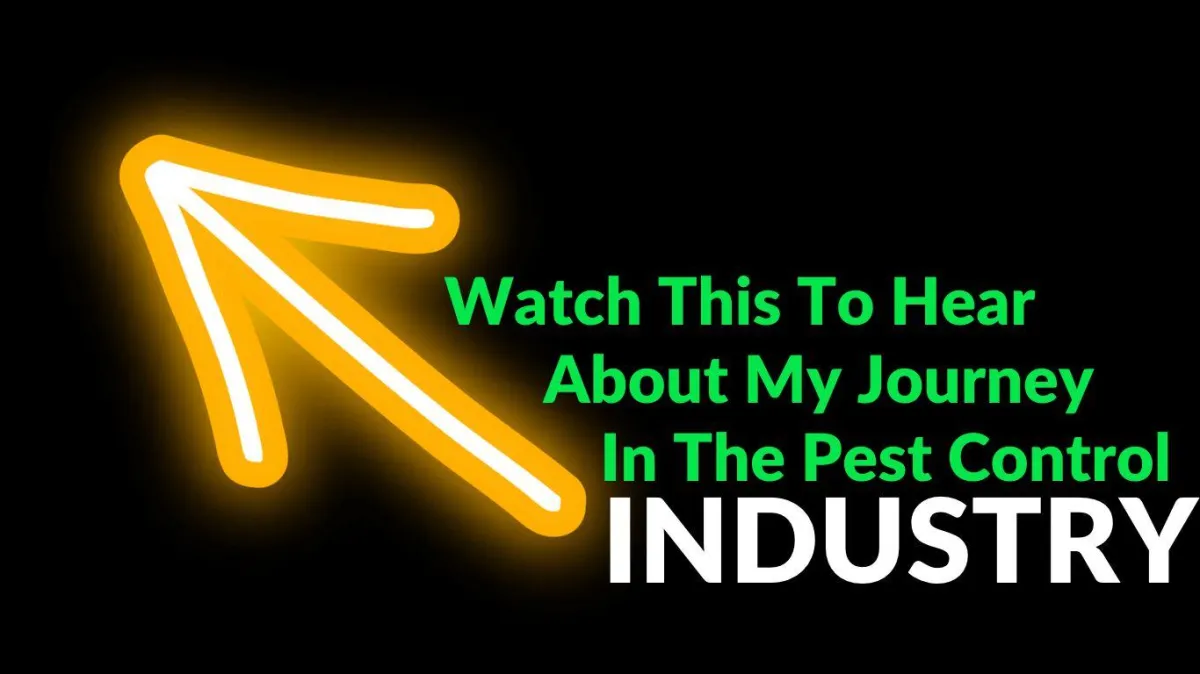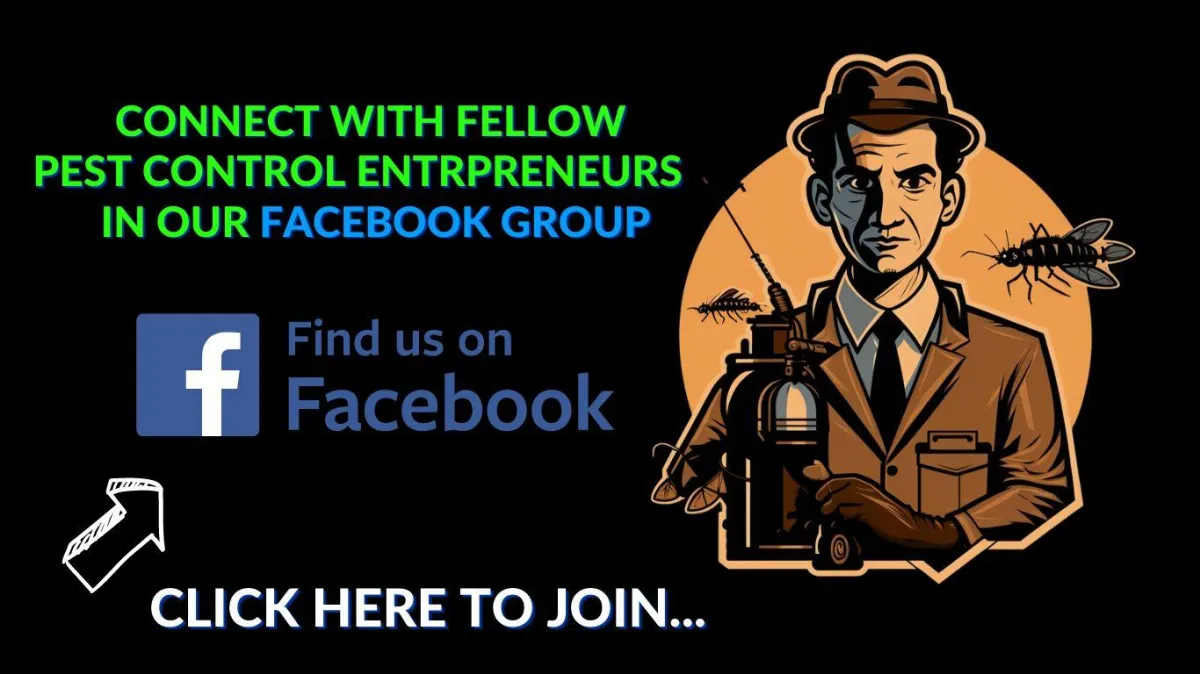Learn How To Start A Business In The Pest Control Industry
Welcome To The #1 Hub On The Internet For Pest Control Entrepreneurs
Do You Need Help Growing Or Starting Your Business?


Click Here To Read The Blog...

Marketing Your Pest Control Business: How to Get Your First Clients
Pest Control Business Marketing Made Easy
Marketing your pest control business is essential for reaching new customers, building brand awareness, and growing your business. As a pest management entrepreneur, you need to have a solid marketing plan in place to stand out from the competition and attract new customers. With the right strategies and tactics, you can effectively market your pest control business and increase your revenue.
One of the best ways to market your pest control business is through digital marketing. By leveraging social media, email marketing, and search engine optimization (SEO), you can reach a wider audience and connect with potential customers in your local area. Creating helpful content, such as blog posts and videos, can also establish your business as an authority in the pest control industry and help build trust with potential customers.
Additionally, networking with other local businesses and building relationships with existing customers can also be effective marketing strategies. Word-of-mouth referrals can be a powerful tool for attracting new customers and growing your business. By providing excellent service and building strong relationships with your customers, you can create a loyal customer base that will refer your business to others.
Do you want to get your first pest control customer? Watch this...
Building Your Online Presence
Building an online presence is a crucial step in marketing your pest control business. Establishing your brand online can help you reach a wider audience, generate leads, and increase your revenue. Here are some ways to build your online presence:
Creating a Website
Having a website is essential for any business, including pest control companies. Your website is a platform where you can showcase your services, pricing, and contact information. Make sure your website is user-friendly, visually appealing, and mobile-responsive. You can also use your website to create a blog where you can share pest control tips and insights. This will not only help you establish your expertise in the field but also attract potential customers to your website.
In today's digital era, marketing your pest control business is crucial to achieving success and staying ahead of the competition. Utilizing social media channels such as Facebook, Instagram, and Twitter can significantly boost your online presence and reach. Share engaging content related to pest control, like infographics, videos, and testimonials from satisfied customers. Additionally, leveraging Google Ads and search engine optimization (SEO) techniques can help drive organic traffic to your website, ultimately leading to increased conversions and business growth.
Another important aspect of marketing your pest control business is cultivating positive customer relationships. Encourage your clients to leave reviews on platforms like Google My Business, Yelp, and social media pages, as these reviews can influence potential customers' decisions. Moreover, implementing a referral program with incentives for both the referrer and the referred client can create a loyal customer base and generate new leads. Lastly, don't forget the value of traditional marketing methods, such as local advertising, networking with related businesses, and attending industry events, which can also contribute to increasing your brand's visibility and attracting new customers.
Social Media Marketing
Social media marketing is another effective way to build your online presence. Create social media accounts for your business on platforms like Facebook, Twitter, and Instagram. Use these accounts to engage with your audience, share informative content, and promote your services. You can also use social media to run targeted ads to reach potential customers in your area.

Search Engine Optimization
Search engine optimization (SEO) is the process of optimizing your website to rank higher in search engine results pages (SERPs). By using relevant keywords, creating high-quality content, and optimizing your website's structure, you can improve your website's visibility online. This can lead to increased traffic to your website and more leads for your business. You can also use tools like Google Analytics to track your website's performance and make data-driven decisions to improve your online presence.
Building your online presence is a crucial step in pest control marketing. By creating a website, using social media marketing, and optimizing your website for search engines, you can establish your brand online, increase your brand awareness, and attract more customers to your business.
Marketing Strategies
When it comes to marketing your pest control business, there are several strategies that you can use to reach your target audience, build your brand recognition, and stand out from your competitors. Here are some effective marketing strategies to consider in this video:
Here are some more tips...
Identifying Your Target Audience
Before you can develop a successful marketing plan, you need to identify your target audience. Who are your ideal customers? What are their pain points and challenges? What motivates them to seek out pest control services? Answering these questions will help you create targeted marketing messages that resonate with your audience and drive sales.
Embracing social media marketing is a powerful strategy to establish and expand your pest control business's online presence. By creating and maintaining accounts on popular platforms like Facebook, Twitter, and Instagram, you can effectively engage with your target audience, share valuable content, and promote your unique services. Make sure to post regularly, using a mix of informative articles, infographics, and videos to showcase your expertise in the pest control industry.
Additionally, social media platforms offer the opportunity to run targeted ads, allowing you to reach potential customers in your specific service area. These ads can be tailored to your budget and goals, ensuring you receive the best return on investment. To further enhance your social media marketing, consider partnering with local influencers or collaborating with complementary businesses to broaden your reach and attract new clientele.
Monitoring and analyzing the performance of your social media marketing efforts is essential for continuous improvement. Regularly evaluate your engagement metrics, such as likes, shares, and comments, as well as the effectiveness of your ad campaigns. This data-driven approach will help you refine your strategy and make informed decisions to optimize your social media marketing, ultimately leading to increased brand awareness, customer loyalty, and business growth.
Developing a Marketing Plan
Once you know who your target audience is, it's time to develop a marketing plan that outlines your goals, strategies, and tactics. Your plan should include a mix of online and offline marketing channels, such as email marketing, content marketing, flyers, print marketing, and postcards. The key is to create a cohesive marketing message that reinforces your brand and speaks directly to your target audience.
After identifying your target audience, the next step is developing a comprehensive marketing plan that outlines your goals, strategies, and tactics. This plan should encompass a mix of both online and offline marketing channels to maximize your reach and create a cohesive marketing message that reinforces your brand while speaking directly to your target audience.
Online marketing strategies should include email marketing campaigns to keep subscribers informed about special offers, promotions, and useful pest control tips. Content marketing, such as blog posts and infographics, helps establish your expertise in the industry and attracts potential customers to your website. Offline marketing efforts, like distributing flyers, print advertisements, and postcards, are essential for reaching customers who may not be as active online. Ensure your branding is consistent across all marketing channels to create a strong and memorable brand identity.
As you implement your marketing plan, it is vital to track and analyze the performance of each marketing channel. Use key performance indicators (KPIs) to assess the effectiveness of your strategies and tactics, and make adjustments as needed. This data-driven approach will help you optimize your marketing efforts and ensure you are making the most of your resources.
By developing and executing a well-rounded marketing plan that combines online and offline marketing channels, you can create a cohesive and powerful message that resonates with your target audience. This, in turn, will contribute to increased brand awareness, customer loyalty, and business growth in the pest control industry.

Email Marketing
Email marketing is a cost-effective way to reach your target audience and build your email list. You can use email marketing to promote your services, offer special promotions and discounts, and share helpful tips and advice. Just be sure to follow best practices for email marketing, such as segmenting your email list, personalizing your messages, and including clear calls-to-action.
Email marketing is an affordable and efficient method for reaching your target audience in the pest control industry. By building a robust email list, you can effectively promote your services, share special promotions and discounts, and provide helpful tips and advice to your subscribers. To ensure the success of your email marketing efforts, it is crucial to adhere to best practices, such as segmenting your email list, personalizing your messages, and incorporating clear calls-to-action.
Segmenting your email list helps you tailor your messaging to specific groups within your audience, resulting in more targeted and relevant content. By personalizing your messages, you can create a stronger connection with your subscribers and increase the likelihood of converting them into customers. Including clear calls-to-action (CTAs) in your emails encourages recipients to take the desired action, whether it's visiting your website, booking a service, or taking advantage of a promotion.
As you execute your email marketing campaigns, it's essential to monitor your performance metrics, such as open rates, click-through rates, and conversions. Analyzing this data will help you identify areas for improvement and optimize your email marketing strategy. By following best practices and consistently refining your approach, you can leverage email marketing as a powerful tool to grow your pest control business and foster lasting relationships with your customers.
Content Marketing
Content marketing is all about creating valuable, informative content that educates and engages your target audience. You can use content marketing to establish yourself as an industry expert, drive traffic to your website, and generate leads. Some effective content marketing tactics for pest control businesses include creating blog posts, videos, infographics, and social media posts.
Content marketing is a powerful strategy focused on creating and distributing valuable, informative content to educate and engage your target audience. By utilizing content marketing, you can establish your pest control business as an industry expert, drive traffic to your website, and generate leads. Implementing a range of effective content marketing tactics, such as blog posts, videos, infographics, and social media posts, can significantly enhance your online presence and attract potential customers.
Blog posts can cover various pest control topics, from prevention tips to the latest industry trends, providing your audience with useful information while showcasing your expertise. Videos offer a more dynamic and engaging format for demonstrating pest control techniques or providing behind-the-scenes looks at your business. Infographics serve as visually appealing tools to convey complex information in an easily digestible manner, while social media posts keep your audience up-to-date and encourage interaction.
To maximize the effectiveness of your content marketing efforts, ensure that your content is well-researched, accurate, and optimized for search engines. Incorporate relevant keywords and phrases to improve your content's visibility in search engine results and reach a wider audience. Moreover, consistently producing and sharing high-quality content across multiple channels helps build trust and credibility with your target audience.
By leveraging content marketing as part of your overall marketing strategy, you can position your pest control business as a reliable source of information and expertise. This, in turn, will help drive website traffic, generate leads, and ultimately grow your business in the competitive pest control industry.
Print Marketing
Print marketing is a tried-and-true marketing tactic that can help you reach a local audience and build brand recognition. You can use print marketing to create eye-catching flyers, brochures, and postcards that highlight your services and promote your brand. Just be sure to target your print marketing efforts to areas where your ideal customers live and work.
Print marketing remains a tried-and-true marketing tactic with the potential to effectively reach a local audience and build brand recognition for your pest control business. By leveraging print marketing, you can create eye-catching flyers, brochures, and postcards that showcase your services and promote your brand to potential customers in your service area.
To ensure the success of your print marketing efforts, it is crucial to target areas where your ideal customers reside and work. Conduct market research and analyze demographic data to identify the neighborhoods and communities that are most likely to benefit from your pest control services. This targeted approach will help you maximize the impact of your print marketing materials and attract customers who are genuinely interested in what you have to offer.
In addition to targeting the right areas, be sure to create visually appealing and informative print materials that clearly communicate your value proposition. Use high-quality images, engaging copy, and consistent branding elements to create a cohesive and memorable impression. Don't forget to include clear calls-to-action (CTAs) that encourage recipients to take the next step, such as visiting your website, calling for a consultation, or booking a service.
By combining print marketing with your digital marketing strategies, you can create a well-rounded and effective marketing campaign for your pest control business. This multi-channel approach will help you reach a broader audience, increase brand awareness, and ultimately drive growth in the competitive pest control industry.
Standing Out from the Competition
When it comes to marketing your pest control business, standing out from the competition is key. Here is a video with a few strategies to help differentiate your business:
Want some more tips? Keep reading...
Differentiating Your Business
One way to differentiate your business is to highlight your unique selling proposition (USP). This could be your expertise in a certain type of pest control, your use of eco-friendly products, or your exceptional customer service. Whatever it is, make sure to communicate it clearly in your marketing materials.
Another way to differentiate your business is to offer specialized services that your competitors don't. For example, you could offer wildlife removal services in addition to traditional pest control services.
Promotions and Discounts
Offering promotions and discounts is a great way to attract new customers and keep existing ones coming back. Consider offering a discount for first-time customers or a referral program that rewards customers for referring new business.
You could also offer seasonal promotions, such as discounts on mosquito treatments during the summer months.
Reviews and Reputation
Your reputation is everything in the pest control industry. Encourage satisfied customers to leave reviews on your website or on review sites like Yelp and Google My Business. Positive reviews can help build trust with potential customers and differentiate your business from competitors.
Make sure to also respond to negative reviews in a professional and helpful manner. This shows that you care about your customers and are committed to providing excellent service.
By differentiating your business, offering promotions and discounts, and building a strong reputation, you can stand out from the competition and attract more customers to your pest control business.
Measuring Success
Measuring the success of your pest control marketing campaign is essential to determine whether your efforts are paying off. There are two critical components to measuring success: analytics and ROI.
Analytics
Analytics is the process of analyzing data to gain insights into how your marketing campaign is performing. By measuring various metrics, you can determine which aspects of your campaign are working and which ones need improvement. Some of the most important metrics to track include:
Website traffic: This metric tracks the number of visitors to your website. By analyzing website traffic, you can determine which marketing channels are driving the most traffic to your site.
Conversion rate: This metric tracks the percentage of visitors to your website who take a specific action, such as filling out a contact form or calling your business. By analyzing conversion rates, you can determine which pages on your website are most effective at converting visitors into leads and customers.
Cost per lead: This metric tracks the amount of money you spend on your marketing campaign for each new lead you generate. By analyzing cost per lead, you can determine which marketing channels are the most cost-effective.
ROI
ROI, or return on investment, is a measure of how much revenue you generate from your marketing campaign compared to the amount of money you spend on it. To calculate ROI, you need to subtract the cost of your marketing campaign from the revenue generated by it and divide the result by the cost of the campaign. A positive ROI means that your campaign is profitable, while a negative ROI means that it is not.
Tracking ROI is essential to determine whether your marketing campaign is worth the investment. By analyzing ROI, you can determine which marketing channels are generating the most revenue and adjust your strategy accordingly.
Overall, measuring success is critical to the success of your pest control marketing campaign. By tracking analytics and ROI, you can determine which aspects of your campaign are working and which ones need improvement, allowing you to optimize your strategy and generate more leads and customers for your business.
Conclusion
In conclusion, successful pest control business marketing requires a multi-faceted approach that combines both online and offline strategies. By leveraging a variety of marketing channels, such as email marketing, content marketing, social media marketing, and print marketing, you can effectively reach a wider audience, establish your brand, and position yourself as an industry expert. As you navigate the competitive landscape, it's essential to stay informed about the latest marketing trends and adapt your strategies accordingly, ensuring that your pest control business remains at the forefront of your customers' minds.
Remember that the foundation of any successful marketing campaign is understanding your target audience. By identifying your ideal customers and their pain points, you can create targeted marketing messages that resonate with them and inspire action. As you develop and implement your pest control business marketing plan, continually evaluate its effectiveness and make data-driven decisions to optimize your efforts. This will ensure that you're making the most of your resources and maximizing your return on investment.
In today's fast-paced, digital world, it's more important than ever to invest in comprehensive and effective marketing strategies for your pest control business. By consistently refining your approach and staying attuned to your audience's needs, you can build lasting relationships with your customers and foster sustainable business growth. Remember that persistence, innovation, and adaptability are the keys to success in pest control business marketing. So, stay dedicated to your marketing efforts, and watch your pest control business flourish.

Listen To Our Podcast And Learn How To...

Create systems for your pest control business so everything runs smoothly and without causing tons of stress to you and your family.

Get your first client and many more so that you can create financial freedom and stop worrying about bills.

Hire a team of sub-contractors so you can spend more time relaxing and less time spraying.

Grow your paid and organic marketing on Google and other channels so you can get clients on autopilot.

Become a pest control industry expert.
Listen To These Highlights From The Show...
Subscribe To The Podcast So You Never Miss An Episode






